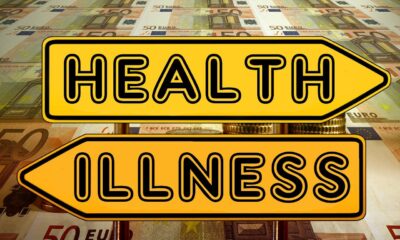Business
Are insurance companies crippling the healthcare industry?
The rationale behind expensive insurance premiums does not compensate for the limited healthcare coverage of an average Joe.

One of the Baby Boomers’ biggest concerns about retirement is the cost of healthcare.
It’s a big problem.
I have a concierge doctor, who I pay a fixed annual fee. This gets me free visits and discounts on blood tests and other things I need. On top of that, I have a high–deductible insurance policy that only covers unexpected costs over $6,000, like if I have a heart attack or something.
I’m accountable, which means I feel the expenses for my healthcare day to day, week to week, and month to month. I pay for my visits and expenses with a credit card linked to my HSA account. There’s no bureaucracy, there’s no paperwork, and there’s no confusion over what’s covered or not under the typical plan.
And there’s no illusion that healthcare is free after I’ve paid my premium!
As a result, I don’t go to the doctor just for anything—just because it’s covered by my healthcare plan. Millions of others do, though. Why wouldn’t healthcare costs be spiraling out of control when people have no incentive to monitor and control their costs?
And doctors must cover their asses against endless lawsuits, so they over-test and over-diagnose everything.
Why should people win the lottery when doctors make a one-out-of-a-thousand mistake?
There’s a reason our healthcare costs about twice as much as it does in other developed countries…
Our system is full of B.S. special interests and insurance bureaucracy that adds layers and layers of costs!
Every step of this chain of special interests is locked in by decades of lobbying efforts.
Insurance companies are NOT in the insurance business. They’re in the bureaucracy business, charging for endless paperwork in what should be a straightforward, pay-for-service-as-needed industry.

Payable concierge medicine is widely getting attention since they’re more affordable than the usual insurance premiums. Patients also reportedly receive more detailed care from physicians. (Source)
But the trend of direct primary care, where people pay a monthly fee for doctors that give them more attention at a fixed and predictable cost is gaining traction.
There’s also a higher level of service—concierge medicine, where you may pay $200-plus per household a month. Like I said, that’s what I have. It’s well worth it because I get visits whenever I need them, and, more importantly, I enjoy preferred access to specialists like cardiologists and internists when I need them.
My primary-care doctor is more accountable to fewer patients and has a more predictable revenue stream.
My high-deductible insurance plan is exactly that: my insurance against the unpredictable.
Of course, health insurance has become a hornet’s nest kicked between Democrats and Republicans since President Trump’s election.
As far as Obamacare is concerned, what idiot couldn’t figure out that if you suddenly added tens of millions of new people to a system with near-term fixed professional skills and healthcare facilities you’d see costs skyrocket?
It’s Econ 101 stuff: supply and demand! Or in this case, inelastic demand.
There’s no market with less rationality and greater cost disincentives than our very own U.S. healthcare system.
And there’s no way to fix this perverted, special-interest-driven system. It needs to break down and be re-created from the bottom up—period.
That starts with consumer-driven, direct primary care systems that make both doctors and consumers accountable for real service. Insurance is only for the more extreme scenarios, so it doesn’t add endless bureaucracy to the system… not to mention endless incentives to go for the “all you can test buffet.”
Insurance companies will, of course, hate this plan. How would they make as much money without their inherent bureaucratic B.S.?
I didn’t set out to organize my healthcare the way I did, but many others do. I just did the logical thing.
I am the revolution. And it’s going to take a revolution to change this overly bureaucratic and complicated industry, where every special interest has carved their fees, costs, and B.S. into stone.
It’s time to shatter those stones.
—
DISCLAIMER: This article expresses my own ideas and opinions. Any information I have shared are from sources that I believe to be reliable and accurate. I did not receive any financial compensation for writing this post, nor do I own any shares in any company I’ve mentioned. I encourage any reader to do their own diligent research first before making any investment decisions.

-

 Africa2 weeks ago
Africa2 weeks agoCôte d’Ivoire Unveils Ambitious Plan to Triple Oil Output and Double Gas Production by 2030
-

 Business1 week ago
Business1 week agoThe TopRanked.io Weekly Digest: What’s Hot in Affiliate Marketing [NordVPN Affiliate Program Review]
-

 Cannabis4 days ago
Cannabis4 days agoCannabis Company Adopts Dogecoin for Treasury Innovation
-

 Biotech2 weeks ago
Biotech2 weeks agoPfizer Spain Highlights Innovation and Impact in 2024 Report Amid Key Anniversaries























You must be logged in to post a comment Login